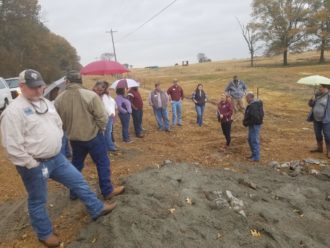STARKVILLE, Mississippi – Mississippi State University is leading by example when it comes to adopting and implementing conservation land practices.
Leslie Burger, a conservation education specialist with the Department of Wildlife, Fisheries and Aquaculture, along with Extension professor Beth Baker, are part of a large team of university scientists who are leading efforts to improve the Red Bud-Catalpa Creek Watershed, portions of which drain MSU’s main campus in Starkville.
“Catalpa Creek flows through the H. H. Leveck Animal Research Center (known as the South Farm by MSU personnel), and farming practices conducted on the farm are not uncommon to those used by many farmers,” said Burger. “As a land-grant university, we are positioned to teach by example and educate landowners about best management practices in a way that encourages them to manage their own farms in an environmentally friendly manner.”
With the Mississippi Department of Environmental Quality supporting practices to improve water quality, MSU researchers have identified critical areas on the farm that may contribute to impairment in the watershed and are implementing best management practices (BMP’s), recommended by the USDA Natural Resources Conservation Service (NRCS), that reduce environmental impacts while improving farm resilience. Researchers have adopted BMP’s on South Farm that landowners can adopt for their own farms, including streambank stabilization, heavy use pads, and riparian buffers.
A recent landowner educational event promoting these practices was a spinoff from a larger conservation project where Extension educators were trained in sustainable agriculture and natural resources conservation topics to promote information transfer and adoption of conservation practices by landowners. The three-year project was funded by a Southern Sustainable Agriculture Research and Education Professional Development Program Grant.
Through the project (ES16-125), “Sustainability Training in Agricultural Resources Systems (STARS): A Train-the trainer model for agriculture and natural resources professionals,” MSU partnered with Alcorn State University, NRCS, and other stakeholders to conduct workshops in areas of soil health, water conservation, nutrient management, wildlife habitat, pollinators, forestry practices, and natural resources business enterprises.
“Those tasked with serving farmers may need further training to assist producers with incorporating those conservation options,” said Baker. “The STARS workshops raised awareness of best management practices to alleviate environmental issues on the farm. Hosting demonstration events allows landowners to see how different conservation practices can provide functional solutions to common problems.”
Baker said that the STARS educational model was used to develop the landowner educational event, as well as many others hosted by STARS-trained Extension agents. Through the SSARE project, it was estimated that over 350 farmers, stakeholders, ag service providers and other professionals gained knowledge in areas of best management land practices. Extension agent attendance at project workshops exceeded 50 during the project.
MSU researchers will be conducting additional STARS workshops in 2020, as well as holding field days on working farms such as South Farm to educate landowners on conservation practices that support farm production and environmental stewardship.
Published by the Southern Region of the Sustainable Agriculture Research and Education (SARE) program. Funded by the USDA National Institute of Food and Agriculture (NIFA), Southern SARE operates under cooperative agreements with the University of Georgia, Fort Valley State University, and the Kerr Center for Sustainable Agriculture to offer competitive grants to advance sustainable agriculture in America's Southern region. This material is based upon work that is supported by the National Institute of Food and Agriculture, U.S. Department of Agriculture, through Southern Sustainable Agriculture Research and Education, under sub-award number: ES16-125. USDA is an equal opportunity employer and service provider. Any opinions, findings, conclusions, or recommendations expressed in this publication are those of the author(s) and do not necessarily reflect the view of the U.S. Department of Agriculture
